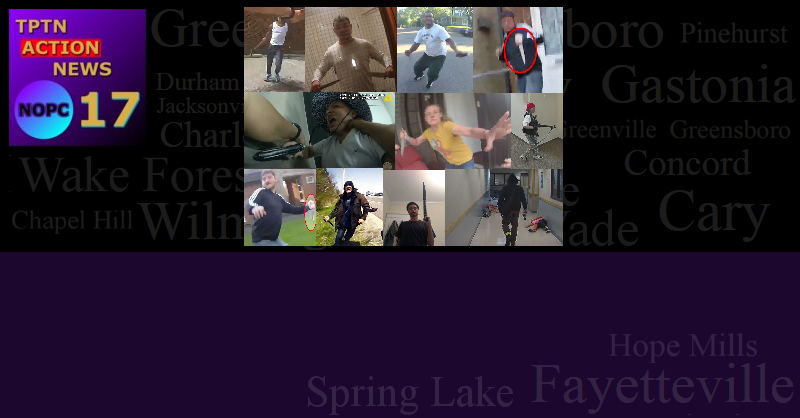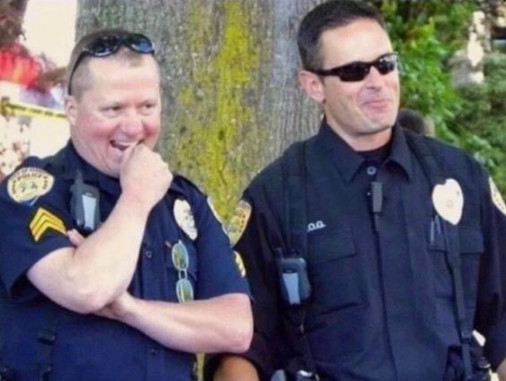
Fayetteville City Council Adopts Retired Police Sergeant’s Proposal
Fayetteville N.C. – Fayetteville City Council adopts retired Fayetteville Police Sergeant Jerry Schrecker’s proposal made back in 2014. The only asset that they forgot was the attorney.
It is quite interesting that the local media claim that the idea for the Fayetteville, NC Office of Community Safety (OCS) emerged from community organizing efforts led by local activists and residents, specifically Lisette Rodriguez and Shaun McMillan, who have been advocating for this initiative for only a year. But the idea was originally proposed by Sgt. Schrecker 10 years ago as evidenced by his proposal published on “American Thinker”. The term ‘stolen valor’ by Rodriguez and McMillian comes to mind. A simple Google search bears this out. And even Sgt. Schrecker doesn’t claim to be the originator saying that the idea has been discussed in law enforcement ‘office talk’ ever since the dismantling of mental institutions, sanitariums, and use of orderlies to collect and transport the mentally afflicted in the past.
The Fayetteville City Council at its June 24 meeting voted that the city will pay for lawyers to represent two police officers named in a federal lawsuit filed by Johnson’s family and her estate. At the same meeting, council members budgeted millions of dollars to put muscle behind an Office of Community Safety. One goal of that office is to offer an “alternative response” to deescalate potentially violent situations through a program that may include social workers, mental health professionals and EMS personnel. The council voted 10-0 to pay for lawyers to represent Fayetteville Police Sgt. Timothy Rugg and Officer Zacharius Borom, according to the June 24 meeting notes and a city spokesman. The officers are accused of violating Johnson’s civil rights when she was shot and killed in her grandparents’ living room on July 1, 2022. ~Myron B. Pitts, Fayetteville Observer Opinion Editor
Furthermore, the anti-law enforcement activist Councilmember Mario Benavente seems to be of the same mind seeing that the city council vote was 10-0.
An accusation does not a conviction make.
Benavente, No Friend of Law Enforcement
Fayetteville, N.C. city councilmember Mario Benavente has shown positions that are easily interpreted as critical of police. But then, the reverse is most assuredly equally true. A profound jealously on the part of Benavente seems to be at work here as Benavente is nothing more than a servant of the city just as are law enforcement officers. However, he possesses even less power and authority than even the most junior law enforcement officer right out of BLET. It seems that this chafes his egotistical, though inaccurate, vision of himself mightily.
Critical of Police Practices: Benavente has expressed concerns about police presence in schools. He voted against the proposal to provide school resource officers (SROs) in Fayetteville public schools, arguing that police presence could lead to more underprivileged students becoming involved in the justice system. He suggested that involving social workers in mental health crises instead of police could reduce the workload for officers and improve retention.
Advocating for Police Reforms: Benavente has also advocated for a co-respondent model where police officers would not respond to every emergency call, particularly those involving mental health crises. This model aims to allow social workers to handle situations that do not require police intervention, which he believes could help address the mental health needs of the community and reduce the burden on police officers.
Though Benavente carefully couches his justifications for his anti-law enforcement rhetoric in phrases like “reduce the workload/burden on law enforcement officers” as if he’s supportive of law enforcement, it’s transparently obvious that his intentions are anything but benevolent. No one, especially the Fayetteville law enforcement officers, are fooled.
In summary, Benavente has shown a critical stance towards certain police practices and supports reforms aimed at reducing the scope of police duties, these positions are part of a broader advocacy of an outright anti-police stance.
 But, as often quoted; “Even a clock is right twice a day,” and “Even a blind squirrel finds a nut every once in a while.” In this issue, Benavente has apparently stumbled onto the side of the right in apparent agreement with Sgt. Schrecker’s proposal.
But, as often quoted; “Even a clock is right twice a day,” and “Even a blind squirrel finds a nut every once in a while.” In this issue, Benavente has apparently stumbled onto the side of the right in apparent agreement with Sgt. Schrecker’s proposal.
Sgt. Schrecker is correct. Let’s do let these psychiatrists, psychologists and attorneys walk in the shoes of law enforcement for a while. And law enforcement most assuredly supports this idea.
Now it will be the psychiatrists/psychologists and attorneys who will get to show their professionalism and show us all how such matters are properly handled. ~ Responding to Mental Health Subjects: a Modest Proposal
By all means, let’s put the ‘professionals’ where they’ll do the most good, at least according to them.
And just maybe, we should insist that each district’s councilmember be tasked as a part of their duties to respond right with those teams to ensure that their policies are being enforced properly. They should be safe enough considering how they’ll be in the presence of those ‘experts’ who have often claimed that they could do a better job of it than law enforcement.
Attorneys “On the Ground” with the Teams are Necessary
Civil Rights Protests: George Floyd Protests: During the civil rights protests following George Floyd’s death in 2020, attorneys were often on the ground as part of legal observer teams. These teams, organized by groups such as the National Lawyers Guild (NLG), monitored police conduct, provided legal support to protesters, and offered immediate legal advice to those detained.
Mass Shooting Incidents: Pulse Nightclub Shooting: After the Pulse nightclub shooting in Orlando in 2016, on the ground attorneys provided immediate legal support to victims and their families. They assisted with a variety of legal issues, including accessing victim compensation funds, handling immigration matters for undocumented victims, and navigating healthcare and insurance claims.
These examples illustrate how attorneys can be integral members of immediate response teams, offering immediate crucial legal support in times of crisis.
Responding to Mental Health Subjects: a Modest Proposal
Here is Sgt. Schrecker’s proposal published on “American Thinker” from 10 years ago;
December 10, 2014
Responding to Mental Health Subjects: a Modest Proposal
By Sgt. Jerry Schrecker (Ret)
So you think that law enforcement is responding incorrectly to out-of-control mentally or drug deranged subjects and that the mental subjects are needlessly dying? Well, I have a solution for that.
Law enforcement isn’t the appropriate entity to be calling for these issues in the first place. Law enforcement’s job is to “enforce law”…not deal with what are clearly mental-health issues which are the provenance of the mental-health disciplines.
So here’s what you do; The county (or whoever is in control of emergency medical services) hires a team to crew one ambulance per every 8 or 12 hour shift that is comprised of;
• One Psychiatrist/Psychologist
• One Attorney
• Two UNARMED Security Guards
• Two EMTs
It will be the responsibility of this team to take all calls regarding any suspected mental-health issues, whether they are armed or not, such as naked person walking down the street… with a knife/gun. Law enforcement will not be sent to these calls because they have already been deemed incapable of handling these calls correctly by psychiatrists/psychologists and attorneys.
Now it will be the psychiatrists/psychologists and attorneys who will get to show their professionalism and show us all how such matters are properly handled.
No more will there be lengthy waits in the hospital tying up a bed because a fully trained and qualified psychiatrist/psychologist will be immediately on hand to make a determination whether the mental health subject is a “danger to himself or others” …as the mental health subject chases him or her around the house or yard with a butcher knife. The psychiatrists/psychologists who have been telling law enforcement for so long how to deal with such and that we don’t have to hurt them can now show law enforcement just how that is accomplished without any use of force. And of course the psychiatrist/psychologist will be the team leader.
The attorney will be a very valuable asset to the team because he or she will be there running alongside of the psychiatrist/psychologist giving them advice on how to not violate the mental health subject’s rights… as they are chased by the knife-wielding mental health subject. Yes, the attorney is there to keep the county out of trouble with lawsuits and to protect the rights of the mental health subject… as they themselves are chased by the knife-wielding mental health subject. But this should be no problem for the attorney. Remember, they’re all the time telling law enforcement what they did wrong… so the attorney knows how to do it just right, of course.
The two unarmed security guards? Why they are there to keep anybody from interfering with the psychiatrist/psychologist and the attorney. Why no… they will not be assisting the psychiatrist/psychologist and attorney because that would violate one of the most common complaints, that there would be 3, 4, 5 on one and that’s wrong! No, the psychiatrist/psychologist and attorney should be just fine dealing with the knife-wielding mental health subject because they have told us all so many times how law enforcement “should” have done it… without so many people.
The two EMTs? They stay inside the locked ambulance until the psychiatrist/psychologist and attorney have the knife-wielding mental health subject under control and properly restrained as appropriate to the incident. Only then are they to exit the ambulance and treat injuries (But, of course there won’t be any — since the psychiatrist/psychologist and attorney know what they’re doing). In cases where gunshots or a gun are reported they will park a block away from the address and the psychiatrist/psychologist, attorney, and unarmed security guards can walk the rest of the way.
Oh, don’t worry about the unarmed security guards — the psychiatrist/psychologist and attorney are professionals and know how to “talk” down a violent knife or gun-wielding mental health subject safely as they so often insist that law enforcement should be able to do.
The cost? Why the offsets of what would certainly be a reduction in lawsuits, wasted officer hours sitting in a hospital for a mental commitment, and simply thinking of the value of a life, makes the cost completely acceptable.
It’s time we put the “professionals” where they will do the most good.
